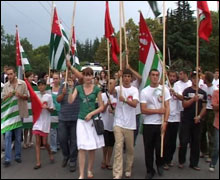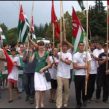
KOSOVA AND THE “FROZEN” CONFLICTS OF THE FORMER USSR
Publication: Eurasia Daily Monitor Volume: 5 Issue: 33
By:

The leaders of the breakaway mini-states of Transnistria in Moldova, Karabakh in Azerbaijan, as well as Abkhazia and South Ossetia in Georgia welcomed Kosova’s unilateral declaration of independence this week and its subsequent recognition by the international community. At a joint press conference this week in Moscow, the presidents of self-proclaimed South Ossetia and Abkhazia Eduard Kokoiti and Sergei Bagapsh, announced they will “address Russia, other CIS [Commonwealth of Independent States] countries, and international organizations to defend and approve our rights to independence.” The Transnistria foreign ministry issued a statement announcing, “The declaration and consecutive recognition of Kosova are of principal importance since they create a new model of conflict settlement based on the priority of the right for self-determination” (Interfax, February 18; RIA-Novosti, February 19).
Transnistria , Abkhazia, South Ossetia, and Karabakh proclaimed their sovereignty in the early 1990s as the USSR collapsed, but no international actor has recognized them. Only Abkhazia is seeking outright independence; Transnistria and South Ossetia have expressed a desire to join Russia, while Karabakh wants to join Armenia. The Abkhaz people still vividly remember the terrible massacre and ethnic cleansing committed by Russian imperial troops and authorities in the 1860s and 1870s, which left 90% of the Abkhaz population either dead or forced into permanent exile in Turkey and the Middle East. As the Russian Empire completed the conquest of the North Caucasus in the 1860s and 1870s, some half a million Muslim Caucasian mountain people were forcibly expelled to the Ottoman Empire. The Caucasian Black Sea coast from Taman in the north to Sochi in the south was entirely depopulated and resettled by Russians. The Abkhaz became a minority in their own land.
Russian officials have strongly denounced Kosova’s independence and have threatened retaliation without stating what it will be. It now seems that Moscow’s reaction will be diplomatic and verbal. The Kremlin will not use gas or oil supplies to Europe as a weapon, nor will it use Kosovar independence as a pretext to immediately recognize any of the self-proclaimed states.
Russia’s decision to not back its harsh words with action is not surprising. Moscow never truly intended to use Kosovar independence to somehow revenge Russia’s humiliation during the 1999 NATO bombing of Yugoslavia that evicted Serbian troops from Kosova. Speaking at a press conference in the Kremlin last week, President Vladimir Putin announced, “We think that to support a unilateral declaration of independence by Kosova is immoral and against the law.” At the same time Putin stated that if the West makes an “incorrect decision” to recognize Kosova’s independence, Russia will not do the same with Abkhazia and the others, but will “ensure that our interests are protected” (www.kremlin.ru, February 14).
Kremlin insiders have personal reasons to keep selling oil and gas to the West at the highest possible volume and the best possible price. Last week Foreign Minister Sergei Lavrov told journalists that Russia has no intention of imposing any sanctions whatsoever on the EU for recognizing Kosova (Interfax, February 13).
The Kremlin unilaterally withdrew all Russian peacekeepers from Yugoslavia in 2003 and has no intention to dispatch solders to the Balkans to help the Serbs in any way. During a farewell press conference in Moscow last month before going to Brussels as Russia’s permanent representative to NATO, Dmitry Rogozin (see EDM, January 31) was asked by a Serbian journalist if Russia would, please, return the several thousand solders it has the right to deploy in Kosova under a 1999 agreement with the United States as part of a NATO-led force to “defend the Serbs?” Rogozin, the flamboyant anti-Western nationalist politician turned diplomat, replied, “The withdrawal of our troops from Kosova was a correct move, and I believe they must not return. We are defending not Serbia, but international law. The Serbs must defend themselves.” It was clear that Rogozin was expressing not just his personal opinion, but the Kremlin line as well. Russia still has political and economic interests in the Balkans, but military action in Kosova is a line it will not cross.
Russia’s future policy on Kosova will be to a large degree decided in the coming months by the pace of Kosova’s international recognition. There never was any internal unity within the Kremlin on the Kosova issue. The Foreign Ministry swayed Putin to take a public stand to defend “international law” against U.S. jingoism. Russian UN ambassador Vitaly Churkin has voiced the hope that the majority of UN states will not support the Western position on Kosova (Itar-Tass, February 18). If Churkin and the Foreign Ministry are proven wrong, if Third World countries, both Muslim and non-Muslim, recognize Kosova en masse, or if by the time Putin’s successor is inaugurated in May there are over a hundred recognitions, Moscow’s position may change. Standing up to the United States as a leader of the emerging multipolar world is one thing, becoming isolated alongside Serbia is another. It may be seen as an appropriate time for Dmitry Medvedev, Putin’s heir apparent, to send a positive signal to the West at the expense of Serb nationalists. Russia might, for example, decide not to block Kosova’s admission to the UN and other international bodies.
The Kremlin would like to increase its influence within the post-Soviet space, but that does not mean it particularly wants to proceed by adding geographical tidbits like Transnistria or South Ossetia to its imperial crown. Moscow wants much more, but, as with the Kosova issue, the multiple views on how to achieve the goal translate into frequently inconsistent policies.




